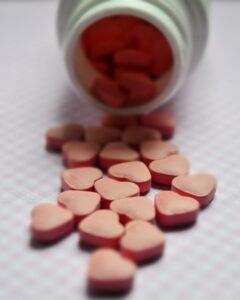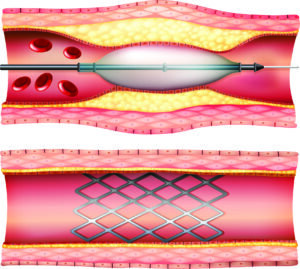Treatment Options
The treatment of vascular disease comes in many forms from surgery, medication to lifestyle change, and generally, due to the complicated nature of the disease and interconnectivity of the risk factors, it requires a mixture of treatment options to correct. Damage to the vascular system can be attributed to blood pressure, blood cholesterol, genetic factors, plaque, among other issues. The treatment of vascular disease starts with the treatment of the underlying issues as well as lifestyle conditions causing them, and when needed interventional medicine or surgery.
Prevention & Lifestyle Change
The range of vascular diseases have a multitude of causes from genetics and the natural aging process to lifestyle choices. While it may not be possible to prevent 100% of vascular disease in every patient, we can help lower the incident of life-threatening occurrences in most people.
Healthy diet
Eating a diet high in fiber, full of leafy green vegetables, healthy fats, lean meats, and whole grains is beneficial to not only prevent cardiovascular disease but also with reversing the damage. Eating a balanced and healthy diet can help lower blood cholesterol, blood pressure, and regain arterial elasticity.
Exercise
Exercise is a key component of a healthy lifestyle, as it trains the body to use oxygen efficiently, improves circulation, increased breathing capacity, increases endurance, and strength, while stabilizing blood sugar and increasing metabolism.
Smoking cessation
Smoking tobacco contributes to the narrowing of arteries throughout the body and destroys the lungs and their ability to process oxygen efficiently. Quitting smoking is the single most significant improvement you can make toward improved cardiovascular health.

Medications
While exercise and a healthy lifestyle change is the best measure for treating and preventing vascular disease, many people need a more immediate treatment option. There are many medications used to prevent the advancement or reverse the symptoms of vascular disease to improve and protect the patient’s quality of life, a combination of medication and exercise and a healthy diet is the best protection.
Cholesterol-lowering medications
The goal of cholesterol-lowering medications is to lower the “bad” low-density cholesterol, which causes plaque buildup in the interior walls of the arteries, called LDL to under 100 milligrams per deciliter. Ideally, through a healthy diet full of lean proteins and healthy fat, you can also increase the “good” high-density cholesterol, which helps the body transfer LDL to the liver for removal.
High blood pressure medications
High blood pressure contributes to vascular disease as it puts undue stress on the artery walls, which over time will break down and damage under constant stress. Medication is essential for patients who suffer from high blood pressure and can be enhanced by exercise and healthy lifestyle changes.
Medications to prevent blood clots
Reduced blood flow through the body, particularly the lower limbs creates an environment where clots can form. Inactivity and high plaque can exasperate this issue. When the blood clot breaks free from the area it formed, it can travel to the heart, brain, or lungs and cause life-threatening damage. Blood clot medication such as aspirin helps to reduce the formation of blood clots by increasing circulation.

Surgical & Interventional Treatment
In advanced or severe vascular disease it is often necessary to perform an interventional or surgical procedure to improve or return blood flow to an artery that is mostly or completely blocked before it causes further damage to the heart, brain, or other vital organs.
Angioplasty
Angioplasty is a catheter-based treatment used in interventional cardiology to reopen blocked arteries. A catheter is a small hollow tube that is inserted through blood vessels to the blocked area, with a small balloon attachment that expands to flatten the blockage and restore blood flow.
Bypass surgery
Bypass surgery is an invasive procedure in which a vascular surgeon uses a blood vessel from another part of your body (or an artificial blood vessel) and grafts it to an area before and after the blockage, rerouting the blood flow around the blockage and reestablishing circulation.
Thrombolytic therapy
Thrombolytic therapy is an injection directly into the clot of the artery causing a blockage; the injection contains a drug with clot-dissolving properties. The goal is to dissolve the blood clot, returning proper blood flow to the affected area.

